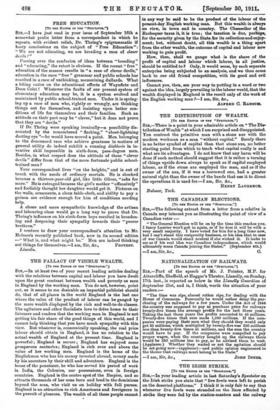FREE EDUCATION.
[To THE EDITOR OF THE "SPECTATOR.']
Sin,—I have just read in your issue of September 16th a somewhat prolix letter from a correspondent in which be repeats, with evident relish, Dr. Thring's epigrammatic if hasty conclusions on the subject of " Free Education": " We are not educating, we are breeding a race of clever devils !"
Passing over the confusion of ideas between "breeding" and " educating," the retort is obvious. If the recent " free " education of the masses results in " a race of clever devils," education in the once " free " grammar and public schools has resulted in a race of unthinking, memorizing dullards. What a biting satire on the educational efforts of Waynflete and Dean Colet! Whatever the faults of our present system of elementary education may be, it is a system evolved and maintained by public school-trained men. Under it is spring- ing up a race of men who, rightly or wrongly, are thinking things out for themselves, and insisting upon better con- ditions of life for themselves and their families. Such an attitude on their part may be " clever," but it does not prove that they are " devils."
If Dr. Thring were speaking ironically—a possibility dis- counted by the remembered " flashing," "sheet-lightning darting eye "—he would have scored a point. Men belonging to the denounced race who achieve greatness in matters of general utility do indeed exhibit a cunning diablerie in in- ventive skill impossible in sixth-form, pass-degree men. Besides, in what respect does the attitude of these " clever devils " differ from that of the more fortunate public school- trained men ?
Your correspondent lives "on the heights," and is out of touch with the needs of ordinary mortals. He is shocked because a thirteen-year-old girl, like little Oliver, "asks for more." He is outraged because the girl's mother " offensively" and foolishly thought her daughter would get it. Pictures on the walls, ornaments, a clean table-cloth, and ability to pay a guinea are evidence enough for him of conditions needing help.
A closer and more sympathetic knowledge of the artisan and labouring class would go a long way to prove that Dr. Thring's influence on his sixth-form boys resulted in broaden- ing and deepening their sympathy towards their " poorer brethren."
I venture to draw your correspondent's attention to Mr. Holmes's recently published book, now in its second edition —" What is, and what might be." Men are indeed thinking out things for themselves.—I am, Sir, &c., PROTEST. Lincoln.










































 Previous page
Previous page